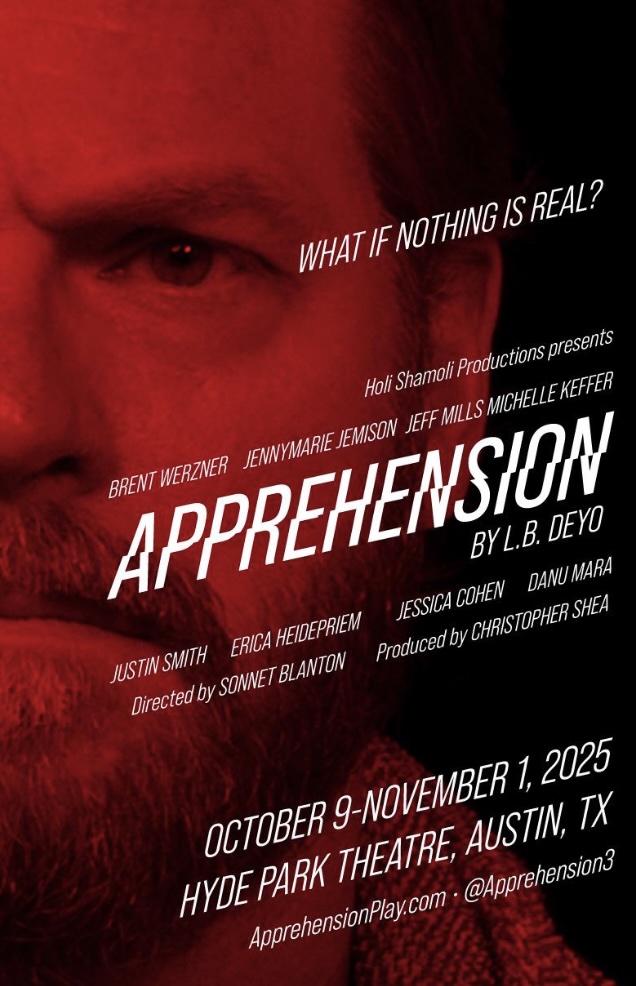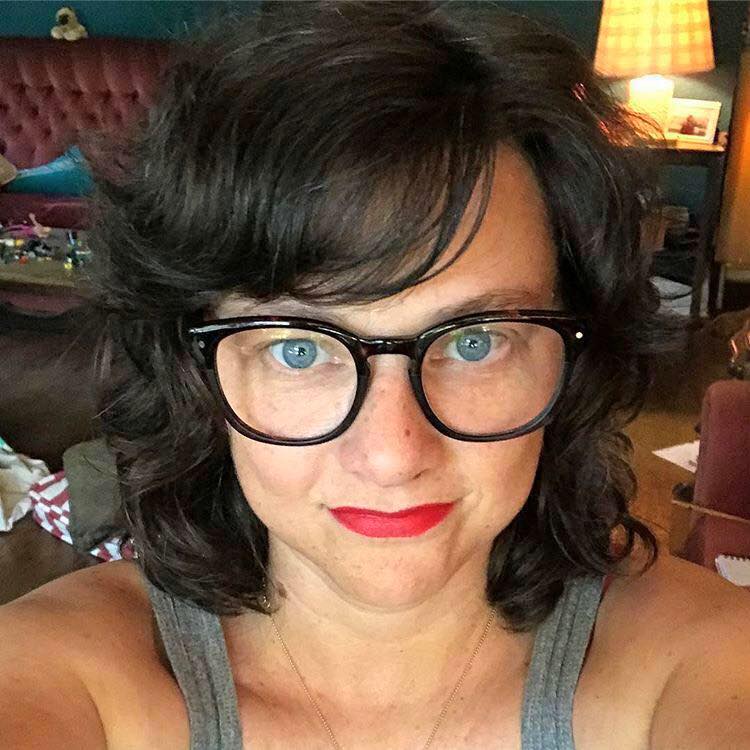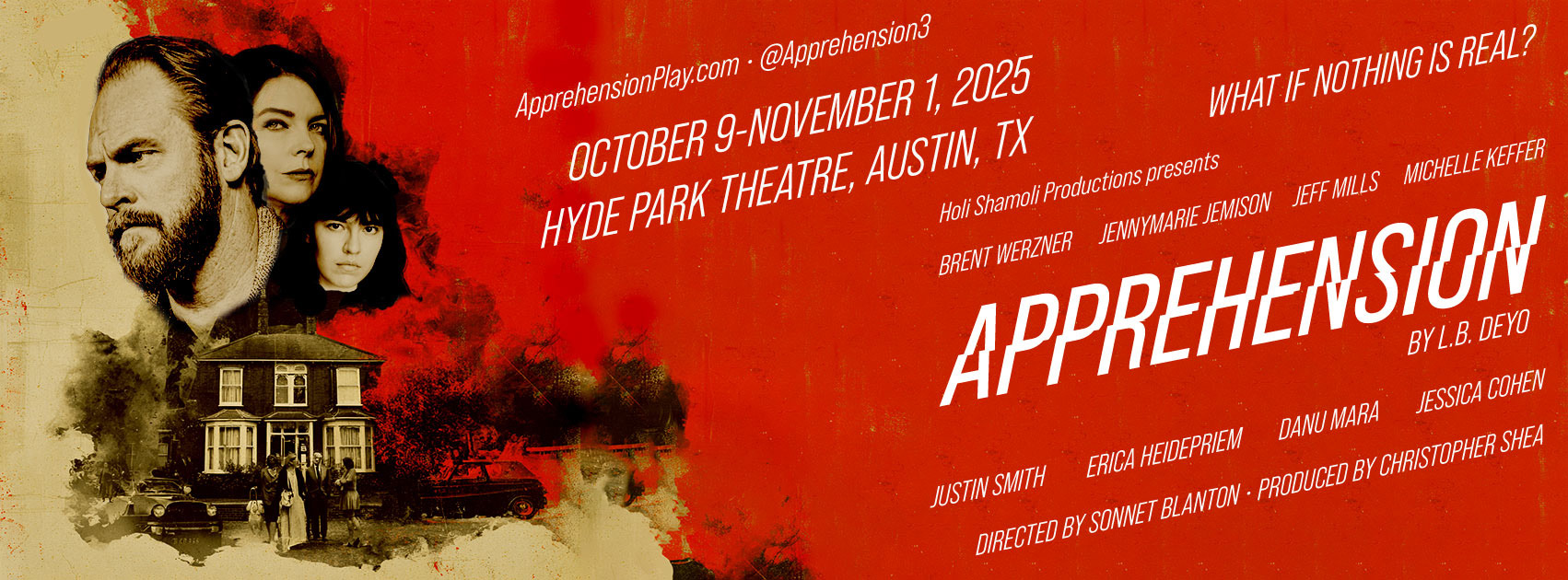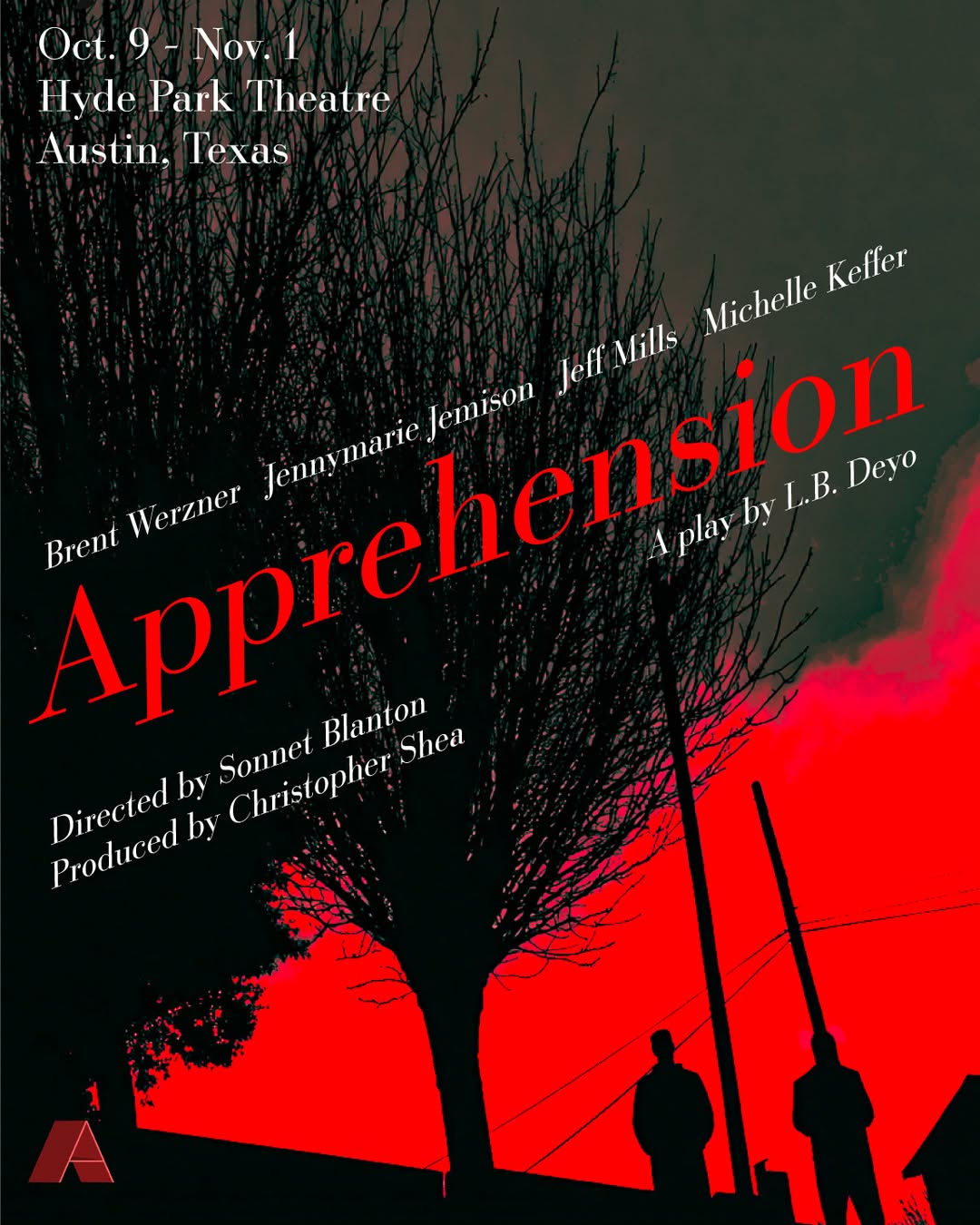Interview with Sonnet Blanton, Director of APPREHENSION by L.B. Deyo
 After being fortunate enough to attend a readthrough of the new play Apprehension, I was equally fortunate to sit down and talk to director Sonnet Blanton. This is the second in a two-interview series.
After being fortunate enough to attend a readthrough of the new play Apprehension, I was equally fortunate to sit down and talk to director Sonnet Blanton. This is the second in a two-interview series.
“Apprehension follows Joe, an ordinary man facing a slew of memory & interpersonal struggles— or so it seems.
As his grasp on reality and memory begins to erode, the relationships he holds most dear
become collateral damage in a deeper unraveling. What begins as self-doubt
morphs into a haunting exploration of identity
and the hidden machinery behind human experience.”
-- From the Holi Shamoli Productions Press Release.
Running Oct. 9-Nov. 1, 2025,Thurs-Sat, 8:00 pm at the Hyde Park Theatre.
Brian Paul Scipione - So what first drew you to Apprehension and what made you want to direct this piece?
 Sonnet Blanton - It was given to me by Chris Shea, the producer of the show, and it had several beloved actors attached to it. Chris asked me to take a look at it and I did and the first impression was surprise. I was surprised and intrigued, and I wanted to get my hands in it.
Sonnet Blanton - It was given to me by Chris Shea, the producer of the show, and it had several beloved actors attached to it. Chris asked me to take a look at it and I did and the first impression was surprise. I was surprised and intrigued, and I wanted to get my hands in it.
BPS- The cast has been described as titans of the Austin theater scene. In what ways does this make your job harder and easier?
SB- I was just thinking about that earlier. I'll say that everyone is really lovely. You know part of my directing is really tending to the room of people and making sure we can all feel safe to create, to explore. Everyone in the room is the same way and has the same kind of respect for that. But a lot of them have known one another for a while so they definitely get the giggles. They need to be reined back in. They're having a lot of fun, but that's a great problem to have. They're all going to back each other up on stage and everything's going to get taken care of, and they're also just really, really, great and lots of fun to watch. It's also delicious with possibility, especially with these actors who just bring so much to everything that they do. It's like I feel like a kid in the candy store.
BPS- The themes of apprehension include blurred reality, memory issues, depression, mental health issues, any thoughts on that and what in your mind separates the themes from the subject of the play?
SB- That's a good question. There's kind of two plays happening at once and they have different themes. I would say that there is definitely a level of the play that is speaking to the kind of cognitive dissonance that people are just living with. Then there's also this story of this man who is losing his mind. I am a depressed person, have been for decades. I have lots of experience and thoughts and feelings about issues of mental health, so I am definitely in touch with that part of it and that's really important to me. I think this also speaks to your question, it's important to me to acknowledge that it's pretty much all white people in that room, on stage and that was a choice because I think we have to take responsibility for that.
BPS- The story is a combination of psychological thriller, family drama, philosophical meditation; how do you balance these different aspects when you're directing it?
SB- I'm really focusing on the actors and the characters, so I think all of that comes down to how do you feel and how do you say that. All of that is in there but my focus has to be on what we are making right here. What are people sitting down and watching for an evening? What is the story that we want to give them? I'll say the family drama part of it is… when you have actors like Brent Werzner and Jennymarie Jemison going up against one another it feels real. That's the thing about theatre; you feel it in the room. That's the art and that's what my focus is on.
BPS- How collaborative was the rehearsal process? Was there any time that a choice an actor made might have changed what you were doing?
SB- It's inherently collaborative. It's funny because of my process, it's hard to see the play until the people are in the room together. What I can do is make all of those people shine in a way that serves the story. The actors are bringing things in all the time and doing things that I haven't told them to do and I get to say I love that, do more of it or it spawns another idea. I'm very open in the first couple of weeks to letting everybody try anything and also ask questions and say, ‘You know, I think maybe it should be like this or what if it's like this?’ [Playwright] LB [Deyo] was really receptive to the work we did on the script, and that changes everything. He has been in the room with us to answer questions, and he's in the play also. It's been great. It’s been very collaborative. Working with Chris is a great working relationship. We've known each other for a really long time.
BPS- Do you consider Joe or any of the other characters to be an unreliable narrator?
SB- Yes. I would say most of the characters are unreliable narrators.

BPS- So what does that do to the audience?
SB- Well, I'm not sure. Like I said earlier, there are kind of two plays going on at the same time. I think the audience will begin to see how those two things come together as the play goes on. I think it's a little unsettling at times and then it gets a lot more unsettling.
BPS- The advertising, the gorgeous fliers and posters, the super creepy website that leans heavily into presenting this like it's a very scary piece, of course, it is the season for that but what's the idea behind it? There's no fear that you're scaring the audience away or anything like that?
SB- Well, I will say that while I have loved everything ,that's not my call. That belongs to Chris and LB. I would like to say to everyone that there's a lot of funny in it too. There's absurdity. There’s certainly a lot of laughs, and you're in good hands with these actors. You'll feel in some ways satisfied at the end and in some ways a little unsettled.
BPS- I have no doubt about that. I keep phrasing it in my head like this is, like, an episode of Friends where all the friends go to hell. Do you have any distinct influences on your directing style when it comes to this piece whether it be horror or comedy?
SB- I'm a fan of lots of things and I have work that's in my library of important texts, of important shows and movies and all of that, but I feel like I'm really kind of instinctual with it. You have to make a thing that hasn't been made before. I think it's all in there but there's nothing to compare it to. It’s finding the right way to tell the story through all of the elements that we have.
 BPS- Any thoughts on the lighting, sound, or set design, especially considering that the play's story basically lies in between the real and the imagined?
BPS- Any thoughts on the lighting, sound, or set design, especially considering that the play's story basically lies in between the real and the imagined?
SB- They're very important to the show: lighting especially and sound especially. The set is definitely going to feel like you’ll know where you are. We have Natalie George working on lights and she's a pro and a great artist and someone who I’ve also been working with for 22, 23 years. I'm excited to get in the theater and see what she has. We talked just last night about a way to change the look of things between those two plays that I was talking about earlier. It's great to collaborate with a designer.
BPS- Looking back, what's the most rewarding or most difficult part of bringing this piece to life?
SB- It's the people, you know, that's the ride. I am a person too, and we're all coming in with what we're coming in with. That is the joy and those are the bumps also, but it's been so lovely, everyone is really good. There's real camaraderie. They've made work together, lots of them went to college together, and to come back and get to do this together is very special. Especially considering what's happened to the Austin theater scene within the last ten years.
BPS- Would you like to talk more about that?
SB- Well, we don't have any places and everything's too expensive. And when you get to be later in life and you have kids, and jobs and family vacations, it's hard to be able to do something like this. You can never pay people enough ,but mostly it's the space. There was a commitment to ground-roots theatre in Austin. There was money. There was support for that. Austin rent was a lot cheaper. It just feels like there's so much money that has floated into the city and so much just changed. That's why this is so incredibly special.
BPS- What kind of response are you hoping for from the audience?
SB- I want people to be engaged. It's like something's burning in the background and the fire just gets bigger and bigger and bigger and I want that to be the kind of journey that they go on. I hope that it implicates people who need that. It’s about this sort of fractured reality that we're currently living in. I feel like it’s everywhere.
BPS- So when telling the story, do you feel like it's necessary or not necessary to make a decision on, for example, Joe's paranoia? Is this real or is it not real?
SB- No. I mean, we talk about all of it. We had a couple of early rehearsals where we talked all of it out. Like what's happening? How does this happen? What is that about? And if those questions are functionally necessary to answer, like they drink this potion and that's how that thing happens, then we address them. It’s talked through and then the actors make their decisions and then we see how that aligns with the way that I feel like the story needs to be told, and so that again is another collaboration.
BPS- I want to revisit something real quick here. The on-stage struggles are both internal and external. The lead character’s internal battles are battling for screen time with the actual plot. What are you doing directing-wise to separate those two things? How do you do that? Is that possible?
SB- There are blocking things that you can do. There are production elements that you can bring in, like lighting that can change. There's a group of people who are telling one story and Joe is telling a different story. That tension is between them; how they deal with him, and how he perceives and deals with the large group. In rehearsals it can feel like directing two plays. Brent is so talented and such a presence on stage and also so kind that he can just do it all. It's a very internal process to play those kinds of feelings for a whole play. It's taxing. It's hard work and I just try to take care of him while he goes through that, and then we shift some things. It's a play.
BPS- So putting the play back into the word play in other words?
SB- Yeah. For me that always has to be there. If you're not playing up there on stage then I don’t really want to watch it. That's the point as far as I'm concerned. Since it’s the art that invites you to kind of play with it, by being in the same room and witnessing it, and breathing the same air and feeling the presence, you know?
BPS- Is this piece unique or would you say it reminds you of any of the productions that you've worked on in the past?
SB- I've worked on some very original, very collaborative pieces before, and I would say that, because of the people who were involved in those shows, it reminds me of that. It's really funny, because I don't like scary movies, I don't really like anything that makes me tense to watch, but I often tend to make work that is dark. In that way it feels similar to me. I don't want to watch it, but I can conjure it.
This interview has been edited for both clarity and brevity.